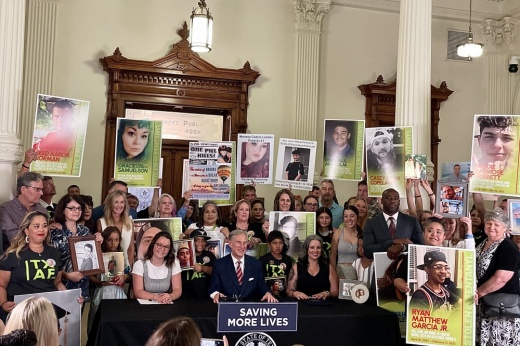Gov. Greg Abbott signed on June 14 four bills, which are meant to raise awareness about fentanyl, combat overdoses and increase penalties for distributing the drug. The families of Texans who died from fentanyl overdoses and several Texas lawmakers joined him at the signing ceremony.
“Fentanyl is an epidemic that, very simply, has taken too many lives,” Abbott said. “... Last year, more than 2,000 Texans lost their lives because of fentanyl. That’s more than five Texans losing their lives every single day.”
House Bill 3908, known as Tucker’s Law, directs school districts to teach sixth-12th grade students about fentanyl abuse, drug overdoses and more every year. The law is named after Tucker Roe, a 19-year-old from Leander who died after taking a fentanyl-laced pill in 2021.
Following Tucker’s death, his mother, Stefanie Turner, founded Texas Against Fentanyl, an organization that raises awareness about the drug.
“We didn’t know,” Turner said regarding the dangers of fentanyl. “That lack of knowledge is what I blame for taking his life.”
Turner said the legislation, which was written by Rep. Terry Wilson, R-Marble Falls, will save lives by providing students and parents with resources and information about the deadly opioid.
“While Tucker’s Law is named in honor of my son, it isn’t for my son,” Turner said. “It’s for every living son and daughter. It’s a law that was created to help protect other children from having to experience the struggle that Tucker did and ultimately prevent other parents from having to live in grief.”
The bill also allows Abbott to designate a week as Fentanyl Poisoning Awareness Week, which will include instruction about the drug in schools. He has not announced when that week will be.
October will be Fentanyl Poisoning Awareness Month in Texas, according to HB 3144. The bill, by Rep. John Lujan, R-San Antonio, passed unanimously in both the House and Senate.
HB 6, by Rep. Craig Goldman, R-Fort Worth, will allow prosecutors to charge drug dealers with murder if they give someone fentanyl and it kills them.
If a medical examiner finds a lethal amount of fentanyl in someone’s system and determines it led to their death, they will be required to list homicide as the manner of death. This applies to deaths that happened or were discovered after the bill goes into effect on Sept. 1.
To prevent fentanyl overdoses on college campuses, Abbott signed Senate Bill 867. The legislation by Sen. Royce West, D-Dallas, directs the Texas Health and Human Services Commission to provide Narcan, an overdose reversal medication, to colleges and universities.
“This provides a lifesaving tool in areas where fentanyl can be found placed [in] other medications,” Abbott said.
What happened to other bills?
The governor has not signed SB 629, a similar proposal that would require public middle and high schools to store Narcan and train staff to administer it. Abbott has until June 18 to sign it, but told Community Impact he “can’t assure that any bill that has not yet been signed is going to be signed.”
Some Texas school districts already have Narcan on campus through partnerships with county governments and other local organizations. Abbott said the Texas Division of Emergency Management, which is responsible for distributing Narcan to county sheriffs, “can and should” be able to provide funding for schools.
Combatting the fentanyl crisis is one of the governor’s top legislative priorities. However, legislation to legalize fentanyl test strips, which he expressed his support for, will not become law this year.
House lawmakers approved HB 362 with bipartisan support in April, but it never reached the Senate floor for a vote. The bill would have decriminalized fentanyl test strips, which are used to safely check if other drugs contain the fentanyl. Because test strips are considered drug paraphernalia, anyone who uses or distributes them can be charged with a misdemeanor.
Drug safety advocates said legalizing test strips would help prevent overdoses.
Abbott previously opposed this type of legislation, but changed his opinion before the 2023 legislative session.
“I want to make sure that we’re using every tool that we can to save lives,” Abbott said during the bill signing ceremony.
When asked if he would bring up the proposal during a special legislative session this summer, the governor said “there will be no future special sessions unless and until the Texas Senate and the Texas House get together and come up with an agreement about how we are going to implement $17.6 billion in property tax [relief].”
The two chambers disagreed on how to best cut property taxes throughout the regular session. They recently passed dueling plans at the beginning of the current special session, and Abbott sided with the House.





